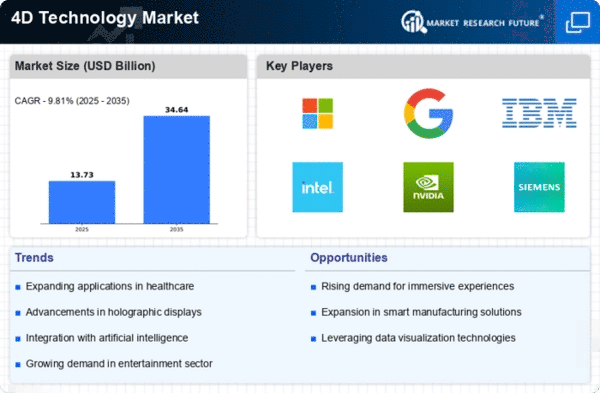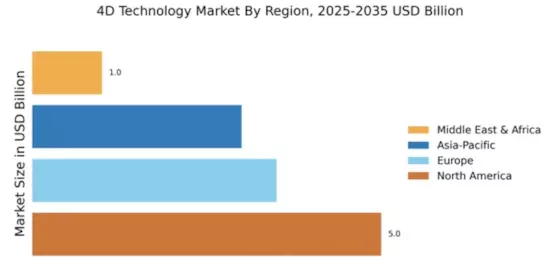Market Growth Projections
The Global 4D Technology Market Industry is poised for substantial growth, with projections indicating a rise from 12.5 USD Billion in 2024 to 35 USD Billion by 2035. This growth trajectory reflects a compound annual growth rate of 9.81% from 2025 to 2035, underscoring the increasing adoption of 4D technologies across various sectors. The market's expansion is driven by factors such as technological advancements, rising demand in healthcare, and emerging applications in entertainment. As industries continue to recognize the value of 4D technology, the market is likely to experience robust growth in the coming years.
Rising Adoption in Healthcare Sector
The healthcare sector is increasingly adopting 4D technology, significantly influencing the Global 4D Technology Market Industry. The ability to visualize complex biological processes in real-time is transforming diagnostics and treatment planning. For example, 4D ultrasound imaging is becoming a standard practice in prenatal care, allowing for detailed assessments of fetal development. This trend is expected to drive market growth, as healthcare providers seek to enhance patient outcomes through advanced imaging techniques. The integration of 4D technology in healthcare is likely to contribute to the overall market growth, aligning with the projected increase to 35 USD Billion by 2035.
Technological Advancements in 4D Technology
Technological advancements play a pivotal role in the expansion of the Global 4D Technology Market Industry. Innovations in software and hardware are enhancing the capabilities of 4D systems, making them more accessible and efficient. For example, the development of high-resolution sensors and advanced algorithms has improved the accuracy of 4D imaging, leading to its adoption in various applications. As these technologies evolve, they are expected to contribute to a compound annual growth rate of 9.81% from 2025 to 2035. This growth trajectory indicates a robust future for 4D technology, as industries seek to leverage these advancements for competitive advantage.
Growing Demand for Advanced Imaging Solutions
The Global 4D Technology Market Industry is witnessing a surge in demand for advanced imaging solutions across various sectors, including healthcare, entertainment, and manufacturing. As industries increasingly adopt 4D imaging technologies, the market is projected to reach 12.5 USD Billion in 2024. This growth is driven by the need for enhanced visualization and analysis capabilities, enabling professionals to make informed decisions. For instance, in the medical field, 4D imaging allows for real-time visualization of organs, improving surgical outcomes. The integration of 4D technology in manufacturing processes also enhances quality control, thereby driving market expansion.
Emerging Applications in Entertainment and Media
Emerging applications of 4D technology in the entertainment and media sectors are reshaping the Global 4D Technology Market Industry. The integration of 4D elements in films, gaming, and virtual reality experiences is enhancing audience engagement and immersion. For instance, theme parks are increasingly incorporating 4D experiences, providing visitors with multisensory attractions that combine visual, auditory, and tactile elements. This trend is likely to attract significant investment, further propelling market growth. As the entertainment industry continues to explore innovative ways to captivate audiences, the demand for 4D technology is expected to rise, contributing to the overall market expansion.
Increasing Investment in Research and Development
Investment in research and development is a significant driver of the Global 4D Technology Market Industry. Governments and private entities are allocating substantial resources to explore new applications and improve existing technologies. This focus on R&D is likely to foster innovation, leading to the emergence of novel 4D solutions that cater to diverse industry needs. For instance, initiatives aimed at enhancing 4D imaging for biomedical applications are gaining traction, potentially revolutionizing patient care. As a result, the market is anticipated to grow to 35 USD Billion by 2035, reflecting the long-term commitment to advancing 4D technology.
















